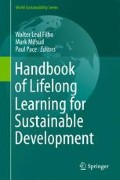Abstract
This chapter highlights the high potential and challenges involved with developing Massive Online Open Courses (MOOCs) for capacity building and climate-friendly technology transfer within the United Nations (UN) system. The paper begins by providing a short introduction to the world of MOOCs and their rapid rise in recent years. The second section explores why sustainable development-oriented international organizations (IOs) have arguably not used this resource to its full potential. It does so with a case study of a MOOC proposal on ‘ecosystem-based climate technologies for adaptation to climate change’ that was discussed between representatives of academia at the UN, and executives from the UN’s Climate Technology Centre and Network (CTCN). A concept note from Oxford University academics, requested by the above-mentioned UN centre, had suggested a free and short MOOC (the standard format of a four- to six-week long course), focusing on high-visibility adaptation technologies. Despite several positive academia-/-UN exchanges, the MOOC never materialized as the funds needed were substantial and not immediately available. Additionally, a previous UNEP MOOC had shown that MOOC costs involving a UN organization—with heavy procurement and administrative constraints—could potentially run significantly higher than what MOOC platforms indicate for universities. Eventually, the UN’s CTCN chose to propose a series of webinars on climate technologies and host the recorded material on its website.
Access this chapter
Tax calculation will be finalised at checkout
Purchases are for personal use only
Notes
- 1.
Shah (2016).
- 2.
See e.g. https://www.coursera.org/specializations.
- 3.
Global MOOC enrolment jumped again last year (2016).
- 4.
Ibid.
- 5.
Ibid.
- 6.
Ibid.
- 7.
Adams (2013).
- 8.
Leckart (2012).
- 9.
The platform of the World Bank’s Open Learning Campus is available at: https://olc.worldbank.org/. The platform of the ILO is available at: https://ecampus.itcilo.org/.
- 10.
The UNEP offered in 2015 ‘The E-Waste Challenge’ MOOC and subsequently the MOOC ‘Disasters and Ecosystem: Resilience in a Changing Climate’. Nothing has been announced since then.
- 11.
The United Nations Information Portal on Multilateral Environmental Agreements is available at: https://www.informea.org/. Based on several Website traffic measurements, its total visits were estimated at only 619 visits over the past six months, of as of 29 March, 2017. See, e.g. https://www.similarweb.com/website/e-learning.informea.org#overview.
- 12.
Hollands and Tirthali (2014).
- 13.
ILO Crowdfunding for Development Massive Open Online Course Report (2015). Retrieved from https://issuu.com/itcilo/docs/cf4dev_evaluation_of_a_massive_open.
- 14.
One of the two authors of this chapter, Dr. Laurent A. Lambert, was then a representative of the global research community at the AB meeting of the CTCN and one of the two Oxford University authors of the MOOC concept notes for a CTCN MOOC.
- 15.
The World Bank’s two online courses on climate-smart agriculture at that time had only focussed on other aspects, namely soil carbon monitoring and sustainable land-water management. See http://einstitute.worldbank.org/ei/.
- 16.
References
Adams, R. (2013). Sal Khan: The man who tutored his cousin—And started a revolution. The Guardian. Last modified April 23, 2013. https://www.theguardian.com/education/2013/apr/23/sal-khan-academy-tutored-educational-website
Crowdfunding for Development Massive Open Online Course Report. (2015). International Labour Organisation, 2015. Retrieved from https://issuu.com/itcilo/docs/cf4dev_evaluation_of_a_massive_open
Global MOOC enrolment jumped again last year. (2016). ICEF Monitor. Last modified January 16, 2016. http://monitor.icef.com/2017/01/global-mooc-enrolment-jumped-last-year/
Hollands, F., & Tirthali, D. (2014). MOOCs: Expectations and reality. Columbia University, May 2014. Retrieved from http://cbcse.org/wordpress/wp-content/uploads/2014/05/MOOCs_Expectations_and_Reality.pdf
Leckart, S. (2012). The stanford education experiment could change higher learning forever. WIRED. Last modified March 20, 2012. https://www.wired.com/2012/03/ff_aiclass/
Shah, D. (2016). Monetization over massiveness: A review of MOOC stats and trends in 2016. Class Central. Last modified December 29, 2016. https://www.class-central.com/report/moocs-stats-and-trends-2016/
Author information
Authors and Affiliations
Corresponding author
Editor information
Editors and Affiliations
Rights and permissions
Copyright information
© 2018 Springer International Publishing AG
About this chapter
Cite this chapter
Lambert, L.A., Hassan, H. (2018). MOOCs and International Capacity Building in a UN Framework: Potential and Challenges. In: Leal Filho, W., Mifsud, M., Pace, P. (eds) Handbook of Lifelong Learning for Sustainable Development. World Sustainability Series. Springer, Cham. https://doi.org/10.1007/978-3-319-63534-7_11
Download citation
DOI: https://doi.org/10.1007/978-3-319-63534-7_11
Published:
Publisher Name: Springer, Cham
Print ISBN: 978-3-319-63533-0
Online ISBN: 978-3-319-63534-7
eBook Packages: Earth and Environmental ScienceEarth and Environmental Science (R0)

